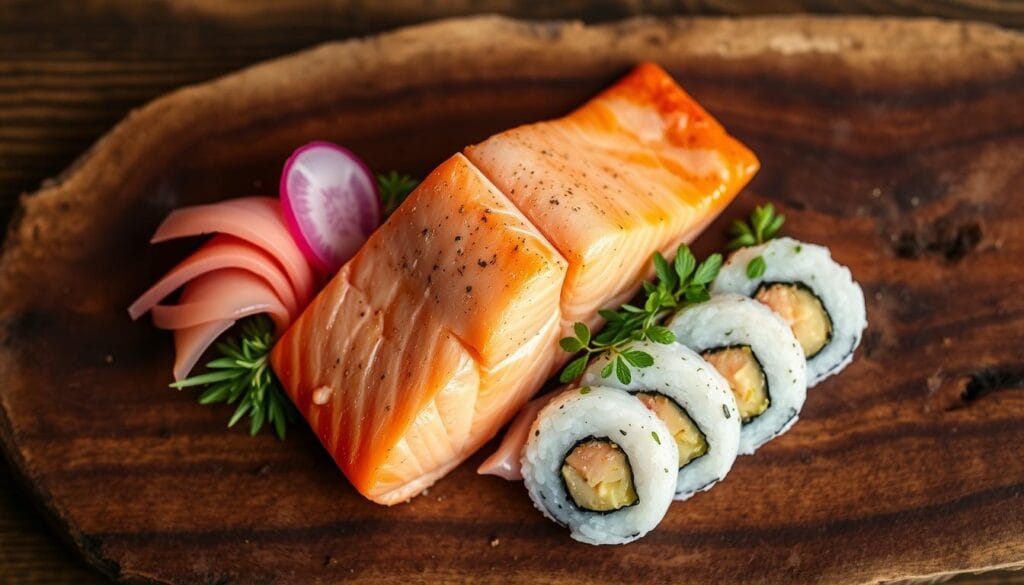Ever crave something super satisfying but want to skip the kitchen chaos? Meet sushi baked salmon—your new go-to for busy days. Ready in just 30 minutes, packed with lean protein, and perfect for your lunchbox, this isn’t just another meal—it’s your secret weapon for stress-free, flavor-packed eating.
Inspired by the viral #SushiBake trend, sushi baked salmon ditches the rolling mats for a simple casserole vibe. Flaky salmon layers over seasoned rice, with a splash of soy sauce adding that irresistible salty-sweet hit. No fancy skills required—just layer, bake, and scoop onto nori sheets for handheld perfection.
Gluten-free, meal-prep friendly, and totally customizable, it’s a win for fitness fans (hello, 25g of protein per serving) and busy parents alike. And that golden, crispy top? Pure umami magic that’s begging for an Instagram moment.
Key Takeaways
- Prep-to-table in 30 minutes for hectic schedules
- Fusion of baked comfort food and sushi flavors
- Portable format ideal for lunches or picnics
- Naturally gluten-free with soy sauce options
- TikTok-inspired twist on traditional Japanese cuisine
- Easy to personalize with favorite toppings
Introduction and the Appeal of Sushi Baked Salmon
What if your next meal could trend on TikTok and fuel your gym gains? Enter the viral sensation rewriting lunchtime rules. Born from foodies craving convenience without compromise, this dish turns meticulous rolls into scoopable layers of umami magic.
From Nori Rolls to No-Fuss Casseroles
Creators like @themodernnonna transformed traditional Japanese fare into oven-ready simplicity. Her 2023 video showcasing stacked nori sheets with seasoned rice and flaky fish amassed 2.1M views. “It’s sushi’s cool cousin who shows up with a casserole dish,” she quipped, sparking thousands of #SushiBake remixes.
Rice vinegar adds tangy brightness to each bite, while toasted sesame seeds deliver crunch. The secret? A creamy blend binding the protein-rich star with green onions for fresh contrast. No rolling mats, no sushi-grade knives—just layer, bake, and devour.
Protein-Packed Meals for Time-Crunched Days
With 25g of muscle-building protein per serving, this recipe answers the eternal question: “How do I eat well when I’m drowning in deadlines?” Each portion packs omega-3s from the fish, amino acids from rice, and metabolism-boosting ginger. Prep it Sunday, reheat all week—your future self will high-five you.
Weeknight warriors love customizing their bowls. Add sriracha mayo for heat or extra sesame seeds for texture. Those crispy edges? Pure golden reward for 20 minutes of oven time. Dinner just got a glow-up.
Essential Elements of “sushi baked salmon”
What separates a forgettable meal from a viral sensation? It starts with ingredient integrity. Every component plays a critical role in balancing texture and taste, transforming simple layers into crave-worthy bites.
Highlighting the Star Ingredient
Sushi-grade fish isn’t just a label—it’s your flavor insurance. These premium fillets undergo strict freezing protocols to eliminate parasites, ensuring safe consumption when lightly cooked. Look for vibrant orange hues and firm flesh that glistens like morning dew.
Chefs recommend cutting fillets into 1-inch squares for even cooking. This size allows edges to crisp while keeping centers tender. Pair with slightly sticky cooked rice—the grains should cling without becoming mushy.
| Salmon Type | Texture | Flavor Impact | Prep Time |
|---|---|---|---|
| Sushi-Grade | Buttery, firm | Rich umami | 5 mins |
| Frozen Fillet | Flaky, dry | Muted taste | 15 mins |
Key Flavors That Sing in Harmony
Three ingredients conduct this flavor symphony: soy sauce adds salty depth, Kewpie mayo brings creamy richness, and rice vinegar cuts through with tangy brightness. Use a 2:1:1 ratio for balanced bites that pop.
When layering, drizzle sauces over cut squares of fish before baking. The heat caramelizes the sugars in soy sauce, creating a glossy glaze. Finish with toasted sesame seeds for crunch that contrasts the soft cooked rice base.
Preparing Your Sushi Rice and Nori
What’s the secret to restaurant-quality texture? It starts long before the oven preheats. Master these foundational elements, and you’ll build flavor layers that hold their shape without turning mushy.
Cooking the Perfect Sushi Rice
Rinse short-grain rice 4-5 times until water runs clear. “Cloudy water means excess starch,” says Chef Akira Yoshida. “That’s what makes grains clump into glue.” Use a fine-mesh strainer for precision.
Cook rice with a 1:1.25 water ratio. Let it steam 10 minutes off heat. Mix 3 tbsp rice vinegar, 2 tsp sugar, and 1 tsp salt in a bowl. Fold gently into warm grains using a wooden spatula. This creates the glossy, sticky base your recipe needs.
Cutting and Handling Nori Sheets
Full-size seaweed sheets can overpower muffin tin cups. Use kitchen shears to slice them into 3-inch squares. Work quickly—nori absorbs moisture fast, losing its crisp snap. Store unused pieces in an airtight container with silica gel packs.
For soy-free diets, try coconut aminos in the vinegar mix. Gluten-free tamari works too. Want extra crunch? Lightly toast nori over a gas flame for 2 seconds per side before cutting. It’ll add smoky depth to every bite.
Mixing the Salmon and Marinade
Mastering the marinade transforms good fish into unforgettable meals. Start by removing the skin—it prevents chewy textures and helps seasonings cling better. Cube fillets into 1-inch pieces for even cooking and maximum sauce coverage.
Mixing Cubed Salmon with Seasonings
Gently toss fish with ½ tsp sea salt to draw out natural oils. This step creates tiny flavor channels in the flesh. Add low-sodium soy sauce next—its umami punch balances the fat content without overwhelming delicate notes.
Mayo and Soy Sauce: Creating the Marinade
Combine 3 tbsp mayo (Kewpie for creaminess or regular for tang) with 1 tbsp soy sauce. Whisk until silky. “The emulsion traps moisture,” explains chef Lisa Nguyen. “It’s like a flavor shield during oven time.”
Pour the blend over cubed pieces, coating each side. Let it rest 5-7 minutes—enough time for proteins to absorb seasonings but not break down. This timing ensures tender results when you bake the dish later.
Quick marinating prevents the acids from “cooking” the fish prematurely. You’ll lock in juiciness while creating that golden crust everyone craves. Ready in under 10 minutes, this method turns basic ingredients into a glossy, restaurant-worthy glaze.
Assembling the Sushi Cups in a Muffin Tin
Transform ordinary ingredients into edible art with this clever assembly method. Using a muffin tin turns layered components into perfectly portioned cups that pop out effortlessly. The secret lies in strategic layering and crisp folds that hold everything together.
Layering Rice and Nori
Lightly grease each muffin cup with oil using a paper towel. Press 3-inch nori sheets into the tin, letting edges extend upward. This creates a edible “bowl” that crisps during baking.
Use a small bowl to portion the rice mixture. Press 2 tablespoons firmly into each nori sheet—this compact base prevents crumbling. Top with marinated fish mixture, spreading it evenly without overfilling.
| Layer Order | Ingredient | Tool Tip |
|---|---|---|
| 1st | Nori Sheet | Kitchen shears |
| 2nd | Rice Mixture | Wet spoon |
| 3rd | Protein Mix | Cookie scoop |
Folding Techniques for the Perfect Cup
Fold opposite nori corners toward the center, creating a square shape. Tuck edges gently—overhandling makes sheets limp. For stubborn corners, dab water on the nori to act as natural glue.
Let cups rest 2 minutes after baking. This allows the nori to crisp slightly, locking flavors in place. Finish with toasted seeds for crunch that photographs beautifully.
Cooking Instructions and Oven Settings
Heat transforms raw ingredients into golden perfection. Timing and temperature control separate sticky disasters from crispy-edged triumphs. Follow these steps to lock in flavors while achieving that Instagram-worthy crunch.

Preheating and Baking Times
Always start with a fully heated oven—skipping this step causes uneven cooking. Set your dial to 375°F (190°C), the sweet spot between caramelization and tenderness. Bake for 14-16 minutes until edges bubble slightly.
For extra crispness, switch to broil during the final 90 seconds. Watch closely—sugar in the glaze can burn quickly. Use an instant-read thermometer to confirm doneness; aim for 145°F internal temperature.
| Oven Setting | Time | Result |
|---|---|---|
| 375°F Bake | 15 mins | Even cooking |
| 500°F Broil | 1-2 mins | Crispy top |
Ensuring Even Cooking and Crisp Edges
Rotate the muffin tin halfway through baking if your oven has hot spots. Avoid overcrowding cups—leave ¼ inch space between portions for heat circulation. “The steam needs room to escape,” advises chef Marco Perez. Otherwise, you’ll get soggy bottoms.”
Let cups cool 3 minutes before removing. Run a butter knife around edges if needed. Garnish with toasted sesame seeds or chopped green onions while still warm for maximum adhesion.
Always use oven mitts—the tin retains heat longer than sheet pans. For meal prep, store cooled portions in airtight containers. Reheat at 300°F to preserve texture without drying out the ingredients.
Variations and Customization Ideas
Your kitchen, your rules—this dish thrives on personal flair. Whether you’re dodging allergens or chasing bold new flavor combos, these tweaks keep meals exciting without extra time in the oven.
Protein Swaps for Every Palate
Not a fish fan? Cube firm tofu into 1-inch squares for plant-powered protein packed with vitamin B12. For shellfish lovers, try chopped shrimp or imitation crab. Always check labels—use tamari instead of soy sauce to keep it gluten-free.
Mix 1 tablespoon sesame oil with 2 tablespoons rice vinegar for a zesty marinade base. Let proteins soak 5 minutes before layering. This quick step infuses depth without marinating all day.
Toppings That Steal the Show
Turn basic bites into flavor explosions. Drizzle sriracha mayo in zigzags across the top or add pickled ginger for tang. Thinly sliced avocado brings creaminess, while crispy fried onions offer crunch.
| Topping | Texture | Prep Time |
|---|---|---|
| Spicy Mayo | Creamy | 2 mins |
| Toasted Coconut | Crunchy | 4 mins |
| Edamame | Chewy | 3 mins |
Balance is key. Pair rich ingredients like cream cheese with sharp radish slices. For extra vitamin C, toss in mandarin orange segments. Just 1 tablespoon of citrus zest can brighten earthy flavors instantly.
Serving Suggestions and Nutritional Insights
Transform your plate into a canvas with smart styling tips that make every bite camera-ready. This dish shines as both a quick weekday course and a showstopper for weekend gatherings. Let’s explore how to elevate its visual appeal while maximizing health benefits.

Presentation Tips for Social Media Success
Arrange individual portions on slate boards or minimalist ceramic plates. Drizzle Kewpie mayo in zigzag patterns using a squeeze bottle. Top with microgreens or edible flowers for pops of color against golden-brown surfaces.
Use tweezers to place toasted sesame seeds precisely. Fold nori corners outward for geometric flair. “Food styling is 30% ingredients, 70% drama,” says content creator @TastyFrame. Capture overhead shots in natural light to highlight contrasting textures.
Fueling Your Day With Smart Nutrition
One serving delivers 320 kcal with 25g protein—ideal for post-workout recovery or sustained energy through busy days. The combination of omega-3s and complex carbs supports brain function and muscle repair.
| Nutrient | Per Serving | Daily Value% |
|---|---|---|
| Calories | 320 | 16% |
| Protein | 25g | 50% |
| Carbs | 28g | 9% |
| Fiber | 2g | 8% |
Store leftovers in airtight containers for up to 3 days. Reheat at 300°F to maintain crispness. Pair with pickled vegetables for added probiotics—your gut will thank you during hectic days.
For extra creaminess without guilt, swap regular Kewpie with light versions. Serve as a main course or appetizer at dinner parties. Either way, your food game just leveled up.
Conclusion
Ready to revolutionize your meal prep routine? This salmon sushi bake simplifies gourmet flavors into three easy steps: layer seasoned rice and marinated fish, bake until golden, then scoop onto crispy nori. Done in 30 minutes, it delivers 25g protein per serving while keeping calories at 320 kcal—perfect for fueling busy days.
Customization is key. Swap proteins or add veggies to boost fiber content. The fusion of umami-rich sauces and oven-crisped edges makes this sushi bake recipe endlessly adaptable. Plus, leftovers stay fresh for three days—meal prep magic at its finest.
Snap a photo of your creation and tag @themodernnonna to join the viral trend. Don’t forget to print this recipe for quick kitchen access. Hungry for more? Bookmark this page for future flavor twists that turn ordinary ingredients into extraordinary meals.
FAQ
Can I substitute Kewpie mayo with regular mayo?
How do I prevent nori sheets from getting soggy?
Can I use frozen fish for this recipe?
What’s the ideal marinating time for the cubed fish?
How do I achieve crispy edges in the oven?
Are there gluten-free alternatives for soy sauce?
How many calories are in one serving?
Can I prep this dish ahead of time?
Try These Next:
- Gluten-Free Desserts for Busy Professionals
- Dairy-Free & Gluten-Free Soup Ideas
- Healthy Weeknight Meals

